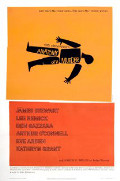
Directed by
Otto Preminger
160 minutes
Rated M
Reviewed by
Bernard Hemingway

Anatomy Of A Murder
Otto Preminger's courtroom drama about a lawyer (James Stewart) defending a soldier (Ben Gazzara) for having killed a man who allegedly raped his wife (Lee Remick) created quite a sensation in its day for its sexual frankness. Despite the shift in screen standards this quality (including a certain prurient overlay) can still be appreciated although the protracted trial proceedings are heavier weather and are not made any lighter by Stewart's typical gee-willikins-I-could-be-fishin' characterisation.
Based on an actual 1952 murder as described in the best-selling novel by Michigan Supreme Court Justice, John D. Voelker (using the pen name Robert Traver), the film was shot on location in Michigan's Upper Peninsula with the trial scenes being filmed in the Marquette County courthouse and Voelker's own 80-year-old house was used as the home and office of attorney, Paul Biegler. Wendell Mayes's screenplay spends a lot of time establishing the characters and then much more on the cat-and-mouse developments of the trial. Disappointingly, however, there are no final summing up statements.
As might be expected given its authorial source, the script works on 2 levels, one a detailed description of the trial, the other a commentary on the strategies used by the opposing counsels (this is largely done through the character of the presiding judge (played by Joseph Welch who was a lawyer in real life and went on to become a judge). Despite the noir-ish opening of the film and Remick's sex kitten playfulness (unconvincing in a woman alleged to have been brutally raped a mere 3 days before), once the trial begins Preminger falls into a more matter-of-fact mode and the film plods through to its witty ending. The high point of the film is the battle of wits between folksily cunning Stewart and George C. Scott's arrogant prosecuting attorney with some humour being provided by Welch's comments and Eve Arden's caustic humour (and less by Arthur O'Connell's happy-go-lucky drunk). Topping things off there's Saul Bass's opening title sequence and the much-vaunted score by Duke Ellington who appears (rather incongruously) with his band.
Want something different?





